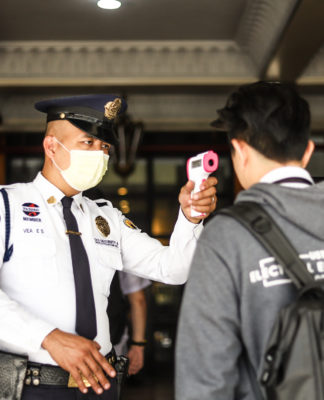
SCHOOL officials have quietly implemented what appears an Orwellian “Big Brother” program to monitor activities in classrooms, raising fears that it might curtail academic freedom on campus.
The Facilities Management Office (FMO) has installed closed-circuit television (CCTV) cameras in at least 10 faculties and colleges located at the Main Building, Beato Angelico Building, St. Raymund’s Building, and St. Martin de Porres Building.
The Management Association of Security and School Officials, Inc. earlier suggested that schools install CCTV cameras as a deterrent to crime.
But Catherine Castañeda, Commission on Higher Education director for NCR, expressed reservations on the proposal. “Baka makaapekto ‘yan sa academic freedom. Hindi po tayo communist country,” abs-cbnnews.com quoted her.
Fr. Rolando de la Rosa, O.P., Rector of UST, said the dome-shaped, infrared-type cameras could not pick up audio and thus, eavesdrop on discussions in class.
Security Office chief Joseph Badinas said the devices were installed primarily for security purposes. He said the FMO would later turn over control of the CCTV cameras to his office.
Dean Michael Anthony Vasco of the Faculty of Arts and Letters said the cameras would help prevent the theft of equipment such as laptops and LCD projectors in classrooms. Dean Josefin de Alban of the Faculty of Engineering said they could also help arrest “intruders” vandalizing the faculty building.
Dean Nilo Divina of the Faculty of Civil Law echoed the university position, insisting that the surveillance cameras would not invade the privacy of students.
“It’s for security reasons,” he said. “[They] are not supposed to be doing anything wrong or private in public places [anyway].”
Fernando Torres, a teacher at the College of Fine Arts and Design, said UST officials should have addressed the problem of “classroom deficiency” rather than install security cameras.
Julius Fernandez, president of the Artlets Student Council, questioned how colleges were picked for the surveillance program.
“I hope the [system] will not be limited [to monitoring] students, because if they will be installing CCTV [cameras], there should be [cameras] installed in faculty rooms as well,” he said.
It remains unclear who could get access to the videos being recorded by the spy cameras. Officials also did not say how long a video footage would be kept in the university files.
Antonio Chua, Office for Student Affairs legal consultant, said they could be used as evidence later on.
Aside from the CCTV cameras, UST has also introduced a school-wide “biometrics” or thumb-screening system to better monitor the attendance of professors, according to an Office of the Secretary General circular dated June 9.
In November 2010, the Faculty of Medicine and Surgery was supposed to implement the system, but was opposed by teachers. The Rector later said doctors would be exempted as long as they “perform their duties well.” Reden D. Madrid and Bernadette D. Nicolas with reports from Rafael L. Antonio

















UST needs to explain whether the very costly price for the cctv is worth its expected benefits! Or UST will the money be better spent for more worthy causes like faculty development, students’ training, and better facilities. Of course, UST administrators are wont to answer by saying, “We are the owners, anyway.” Yes you are the owners, but you still need to explain still more convincingly why you choose structures over your people’s well-being.
The spy camera will help to prevent theft, such as laptops and LCD projector in the classroom of the equipment. But surveillance cameras will infringe upon the privacy of students, even if they in the class.
Spy camera is the best security systems in florida. I appreciate you because it will helps to prevent theft, such as laptops and LCD projector in the classroom of the equipment. Thanks!
Stealing is getting rampant anywhere. Installing CCTV cameras even in the classrooms can be a good deterrent for those who might be planning to steal another person’s property. CCTV needs to be tried and if this is effective at minimizing theft then it is fine to continue using it. Let’s try it first and see if it works well for everyone.